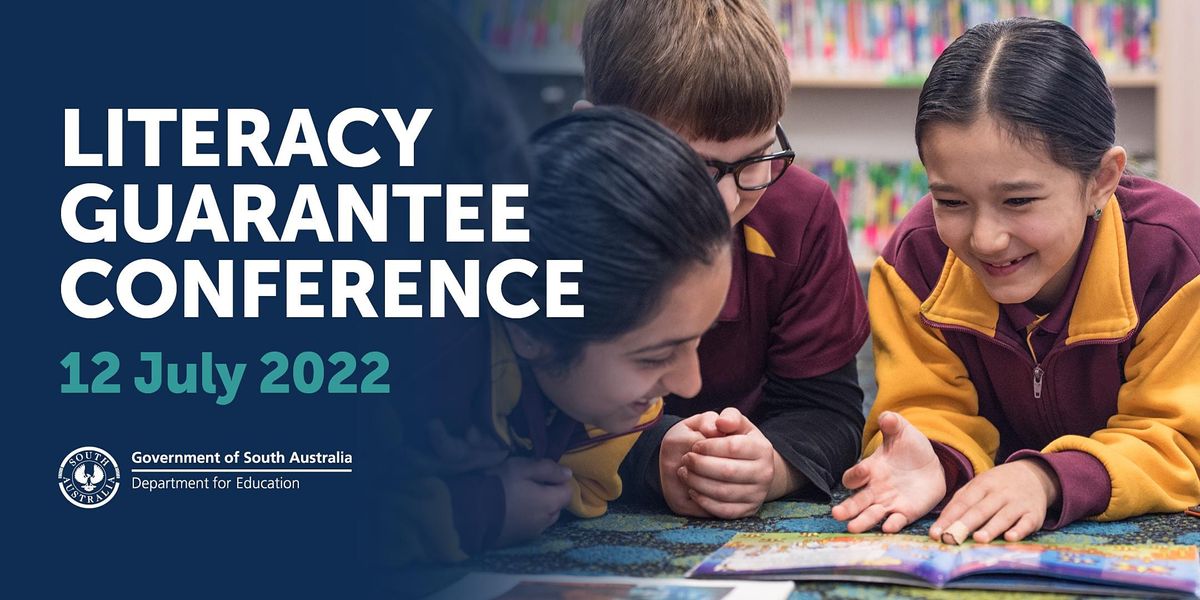Effective Classroom Practice: Literacy for All
Schedule
Tue Jul 12 2022 at 08:30 am to 03:30 pm
Location
Adelaide Convention Centre | Adelaide, SA

About this Event
Educational leaders and teachers from the Department for Education, Catholic Education SA and the Association of Independent Schools of SA are invited to attend the next Literacy Guarantee Conference which will feature a range of leading experts in literacy to support leaders and teachers more effectively meet the needs of all students.
Keynote address: Alison Clarke
Speech Pathologist, SpelfabetPhonology for teachers
Familiarity with the sound system of English is very helpful when teaching reading and spelling, and helps make a superficially baffling spelling system more logical, but teachers often aren’t taught much about it. This session will discuss:
• Distinctive features of the 44 phonemes of spoken Australian English – manner, place and voicing of consonants, vowel locations and types (monophthongs and diphthongs).
• The usual ages at which children acquire the speech sounds, and which are confusable/most difficult. The impact of delayed articulation on reading/spelling.
• Teaching phonemic and articulatory awareness – theoretical debates and practical activities.
• Saying sounds precisely and using connected phonation.
• Syllable types and allowable consonant combinations before and after vowels.
• Coarticulation – the mouth is a mushy place, so sounds run together.
• Schwa and elided sounds/syllables – it’s a stress-timed language, and humans always take shortcuts.
There will be time for some questions/discussion.
Alison has been a Speech Pathologist since 1988, and also holds a Masters in Applied Linguistics and an ESL teaching certificate. She has worked for the Victorian Education Department, Yooralla, SCOPE, a University in Mexico, a hospital in London, the Royal Children’s Hospital and Lewis and Lewis. She started her private practice in 2000 in Footscray, moved it to Clifton Hill in 2012, and then to North Fitzroy in 2018.
Alison set up this Spelfabet website in 2012, because she was keen to encourage early literacy teaching and intervention that reflects scientific reading research. She was 2015-16 Vice President of Learning Difficulties Australia (LDA), and has also worked as an administrator, and been a City Councillor and Mayor. She received LDA’s 2018 Mona Tobias Award.
Morning Breakout Sessions
1. Diving into vocabulary - the important role it plays in reading comprehension
Participants will develop a deeper understanding of:
• How oral language connects to reading development
• The importance of vocabulary and how it impacts on children’s reading
• How deep knowledge of vocabulary is established through experience and instruction including etymology and morphology
• Selecting words based on the three-tier vocabulary model
• Developing an explicit instructional routine for introducing target vocabulary
Resources will be made available to participants to support the explicit teaching of vocabulary.
Presenter: Kate Marschall
2. Dyslexia 1 – differentiated not different – building an understanding of learning difficulties and dyslexia
Participants will:
• Develop an understanding of learning difficulties, with a specific focus on dyslexia
• Examine indicators that may be seen in the classroom
• Dispel common myths related to dyslexia
• Explore the characteristics of dyslexia
• First-hand experience the difficulties associated with dyslexia through a simulation
Presenter: Bec Eli
3. Two sides of the same coin – how and why to connect reading and writing skills for R-2 students – part one
*Important note: this workshop is the first half of a 3-hour workshop so participants must register for part two to complete the whole workshop
As early years teachers, we have good knowledge for scaffolding students to learn to read. We also know that most students find writing far more difficult. This workshop will explore the interconnectedness of the reading and writing processes and how they can be used together to strengthen the literacy learning in an R-2 classroom. We will use the theoretical frameworks of the simple view of reading and simple view of writing, then highlight practical strategies and resources to support student learning. The workshop will be hands on and include time for participants to start to plan a unit of work.
Participants will:
• deepen their understanding of early literacy learning with a focus on the reciprocal processes of decoding and encoding
• explore high impact teaching strategies to support student achievement
Participants are invited to bring a children’s picture book planned for use in Term 3 as part of the planning process in the workshop.
Presenters: Kellie Burge & Margo Leatch
4. Hooked on phonics: the essential elements of a Systematic Synthetic Phonics (SSP) lesson
In this workshop you will be introduced to the core components of an effective Systematic Synthetic Phonics (SSP) lesson.
The presentation will be informed by evidence and research that advocates a focus on explicit teaching to ensure that children master the code that underpins written language so that they can read to understand, learn and become successful readers.
You will work through the Literacy Guarantee Unit instructional routine and experience first-hand what it feels like to use the prompts and language required to engage and challenge students in a phonics lesson.
This workshop will be highly interactive and engaging with a junior primary focus.
Presenter: Mig Colliar
5. Death to the spelling contract - the fundamentals of quality spelling instruction
Stuck for ideas to support spelling in the primary years? Tired of spelling lists? In this workshop, we explore the core elements of spelling development and look at practical activities to support quality spelling instruction. These activities can be used with the whole class and differentiated to suit the needs of all learners. We will provide activities to target phonology, orthography, morphology and etymology.
Presenters: Ashlee deWet-Cowland & Daina Wilson
6. Language from the heart - supporting speakers of Aboriginal English to unlock standard English phonology
In this workshop, participants will develop an understanding of:
• The nature and structure of Aboriginal English, spoken by a diverse range of speakers across Australia
• The importance of home language experiences in language learning and how to accurately identify Aboriginal English speakers in the educational context
• Strategies to support and empower speakers of Aboriginal English to be effective code switchers between Standard Australian English and Aboriginal English, whilst also valuing and empowering the role of Aboriginal English in their lives
• Strategies to support speakers of Aboriginal English to develop strong foundations in Standard Australian English phonology
Presenters: Chris Keynes & Vicki Hudson
Afternoon Breakout Sessions
1. The trick to getting tricky words into long term memory - orthographic mapping and sight words
Participants will develop a deeper understanding of:
• The orthographic mapping process that enables efficient reading
• The key instructional practices that support orthographic mapping and those that don’t
• What a ‘sight word’ is
• How to teach words with irregular spellings and get them into long term memory
• Resources will be made available to participants to support phoneme-grapheme mapping in the classroom and the teaching of words with irregular spellings.
Presenter: Kate Marschall
2. Dyslexia 2 – differentiated not different – dyslexia in the classroom - appropriate supports for students with dyslexia within a mainstream classroom
This workshop is suitable for educators who have a basic understanding of the specific learning difficulty dyslexia. In this workshop participants will focus on:
• Identifying key support strategies for students with dyslexia in the mainstream classroom
• Plan for implementation of 3 strategies to accommodate and meet the needs of students with dyslexia
Content covers students in primary and secondary settings.
Presenter: Bec Eli
3. Two sides of the same coin – how and why to connect reading and writing skills for R-2 students – part two
*must have completed part one as this workshop is the second half of a 3-hour workshop
As early years teachers, we have good knowledge for scaffolding students to learn to read. We also know that most students find writing far more difficult. This workshop will explore the interconnectedness of the reading and writing processes and how they can be used together to strengthen the literacy learning in an R-2 classroom. We will use the theoretical frameworks of the simple view of reading and simple view of writing, then highlight practical strategies and resources to support student learning. The workshop will be hands on and include time for participants to start to plan a unit of work.
Participants will:
• deepen their understanding of early literacy learning with a focus on the reciprocal processes of decoding and encoding
• explore high impact teaching strategies to support student achievement
Participants are invited to bring a children’s picture book planned for use in Term 3 as part of the planning process in the workshop.
Presenters: Kellie Burge & Margo Leatch
4. Hooked on phonics: the essential elements of a Systematic Synthetic Phonics (SSP) lesson
*Note: this workshop is a repeat of the morning workshop
In this workshop you will be introduced to the core components of an effective Systematic Synthetic Phonics (SSP) lesson.
The presentation will be informed by evidence and research that advocates a focus on explicit teaching to ensure that children master the code that underpins written language so that they can read to understand, learn and become successful readers.
You will work through the Literacy Guarantee Unit instructional routine and experience first-hand what it feels like to use the prompts and language required to engage and challenge students in a phonics lesson.
This workshop will be highly interactive and engaging with a junior primary focus.
Presenter: Mig Colliar
5. Death to the spelling contract - the fundamentals of quality spelling instruction
*Note: this workshop is a repeat of the morning workshop
Stuck for ideas to support spelling in the primary years? Tired of spelling lists? In this workshop, we explore the core elements of spelling development and look at practical activities to support quality spelling instruction. These activities can be used with the whole class and differentiated to suit the needs of all learners. We will provide activities to target phonology, orthography, morphology and etymology.
Presenters: Ashlee deWet-Cowland & Daina Wilson
6. Language from the heart - supporting speakers of Aboriginal English to unlock standard English phonology
*Note: this workshop is a repeat of the morning workshop
In this workshop, participants will develop an understanding of:
• The nature and structure of Aboriginal English, spoken by a diverse range of speakers across Australia
• The importance of home language experiences in language learning and how to accurately identify Aboriginal English speakers in the educational context
• Strategies to support and empower speakers of Aboriginal English to be effective code switchers between Standard Australian English and Aboriginal English, whilst also valuing and empowering the role of Aboriginal English in their lives
• Strategies to support speakers of Aboriginal English to develop strong foundations in Standard Australian English phonology
Presenters: Chris Keynes & Vicki Hudson
Where is it happening?
Adelaide Convention Centre, North Terrace, Adelaide, AustraliaEvent Location & Nearby Stays:
AUD 50.00
